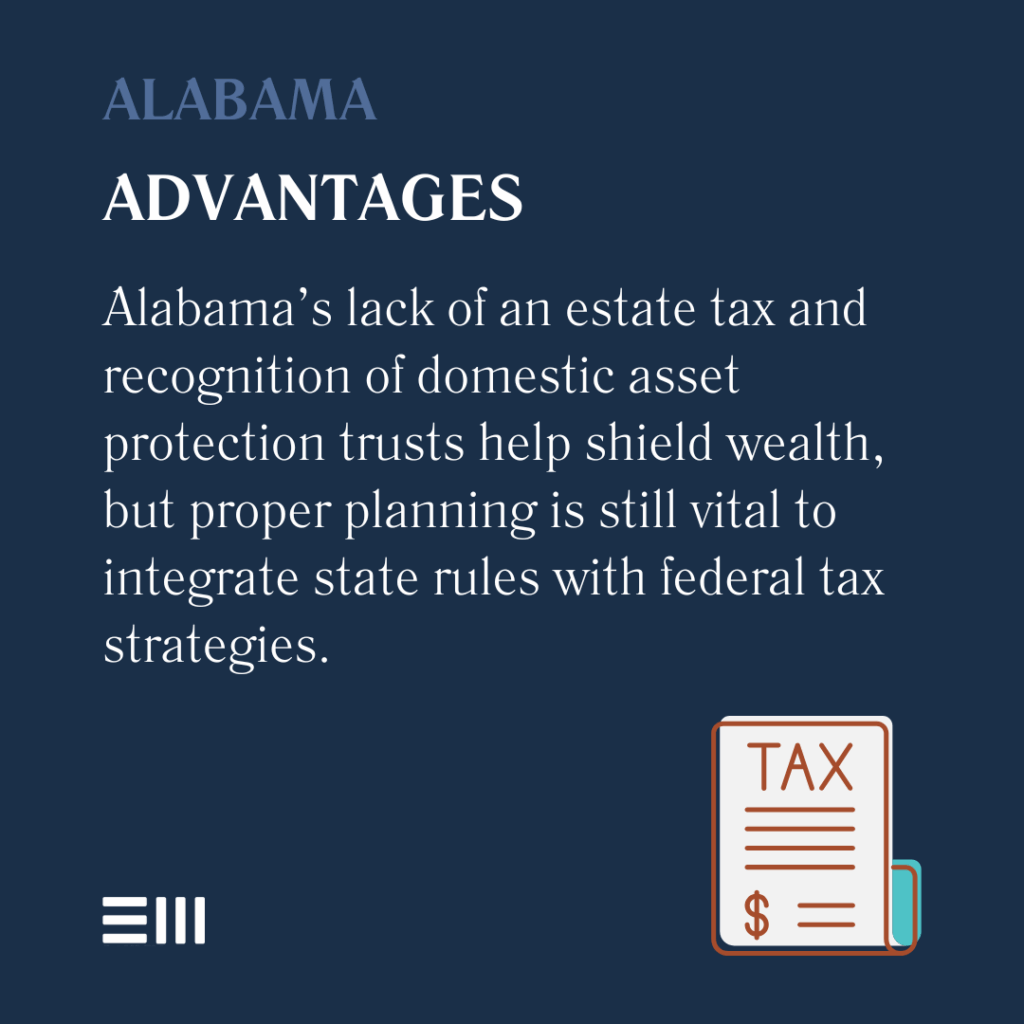
When business owners sell companies for millions or families inherit substantial wealth, the complexity of preserving these assets across generations becomes immediately apparent.
Without sophisticated estate planning strategies, federal estate taxes can claim 40% of assets exceeding exemption thresholds, while family disputes and poor succession planning can erode what remains—challenges that proper estate planning directly addresses.
Understanding High Net Worth Estate Planning in Alabama
High net worth estate planning extends far beyond simple wills and basic trusts.
For Alabama families with substantial assets, comprehensive planning addresses complex tax implications, multi-generational wealth transfer, business succession, and asset protection from potential creditors or lawsuits.
The federal estate tax exemption stands at $12.92 million per individual in 2023, but without strategic planning, estates exceeding this threshold face a 40% tax rate on the excess. Alabama doesn’t impose its own estate tax, but federal obligations and other considerations make sophisticated planning essential for preserving family wealth.
Key Components of Comprehensive Estate Planning in Alabama
Effective estate planning for high-net-worth individuals requires multiple integrated strategies working together.
Each component serves specific purposes in the overall wealth preservation framework.
#1: Advanced Trust Structures
Trusts form the backbone of sophisticated estate planning, offering flexibility, tax advantages, and asset protection.
Revocable living trusts provide privacy and avoid probate while maintaining control during your lifetime. Irrevocable life insurance trusts remove life insurance proceeds from taxable estates.
Grantor retained annuity trusts enable transferring appreciation to beneficiaries with minimal gift tax consequences. Charitable remainder trusts provide income during life while benefiting chosen charities and reducing estate taxes.

#2: Tax Minimization Strategies
Strategic tax planning can save millions in estate and gift taxes. Annual exclusion gifts of $17,000 per recipient reduce estate size without using lifetime exemptions.
Lifetime exemption gifts leverage the current high exemption before potential legislative changes. Generation-skipping trusts preserve wealth for multiple generations while minimizing transfer taxes.
Charitable deductions through private foundations or donor-advised funds reduce taxable estates while supporting meaningful causes.
#3: Business Succession Planning
Family businesses require specialized planning to ensure smooth transitions. Buy-sell agreements establish clear succession protocols and valuation methods. Family limited partnerships enable transferring business interests while maintaining control. Voting and non-voting share structures preserve family leadership while distributing wealth. Key person insurance protects business value during ownership transitions.
#4: Asset Protection Measures
Protecting wealth from potential threats requires proactive strategies. Domestic asset protection trusts shield assets from future creditors in certain states.
Limited liability companies provide operational flexibility with liability protection. Umbrella insurance policies offer additional coverage beyond standard liability limits. Prenuptial agreements for family members protect inherited wealth from divorce proceedings.
Each strategy must align with overall family goals and values while addressing specific risks and opportunities unique to your situation.
Common Pitfalls in High Net Worth Planning
Even wealthy families with access to top advisors can fall into planning traps. Recognizing these pitfalls helps ensure comprehensive protection.
Procrastination remains the most costly mistake, as tax laws change and planning opportunities disappear. Failing to update plans after major life events like marriages, divorces, births, or deaths creates gaps in protection. Inadequate liquidity planning forces asset sales at unfavorable times to pay estate taxes.
Poor communication about estate plans leads to family conflicts and contested wills. Overlooking international assets or beneficiaries creates complex tax and legal complications.
Understanding these common mistakes enables proactive planning that addresses potential issues before they threaten family wealth and harmony.
Alabama-Specific Considerations
While Alabama’s favorable tax environment benefits high-net-worth families, several state-specific factors require attention.
Alabama recognizes domestic asset protection trusts, providing enhanced creditor protection for properly structured trusts. The state’s homestead exemption offers limited protection, making additional asset protection strategies important.
Alabama’s intestacy laws may not align with your wishes, emphasizing the need for comprehensive planning documents. Local property laws affect how real estate transfers to beneficiaries.
These state-specific elements must integrate seamlessly with federal tax planning and multi-state considerations for families with assets across jurisdictions.

Frequently Asked Questions About High Net Worth Estate Planning in Alabama
Understanding common concerns helps high-net-worth individuals in Alabama make informed decisions about their estate planning needs.
When Should High Net Worth Individuals Start Estate Planning?
Estate planning should begin as soon as substantial wealth accumulates, regardless of age. Young entrepreneurs, inherited wealth recipients, and successful professionals benefit from early planning that evolves with changing circumstances. Starting early maximizes tax-saving opportunities and ensures protection during wealth-building years.
How Often Should Estate Plans Be Reviewed and Updated?
Comprehensive reviews should occur every three to five years or after significant life events. Tax law changes, family dynamics, asset values, and personal goals evolve over time. Regular reviews ensure plans remain aligned with current laws and family circumstances while maximizing available planning opportunities.
What Documents Are Essential for High Net Worth Estate Plans?
Beyond basic wills, essential documents include revocable living trusts, powers of attorney for finances and healthcare, advance directives, and pour-over wills. Business owners need buy-sell agreements and succession plans. International assets require specialized documentation addressing cross-border tax and legal issues.
How Can Charitable Giving Be Incorporated into Estate Plans?
Charitable planning offers tax benefits while supporting meaningful causes. Private foundations provide family involvement in philanthropy across generations. Charitable remainder trusts generate income while providing future charitable gifts. Donor-advised funds offer immediate deductions with flexible future giving. Strategic charitable planning reduces estate taxes while creating lasting legacies.
What Role Do Family Meetings Play in Estate Planning?
Regular family meetings foster understanding and prevent future conflicts. Discussing wealth transfer plans, family values, and expectations prepares heirs for future responsibilities. Professional facilitators can guide sensitive conversations about money, inheritance, and family business succession.
These questions represent starting points for deeper conversations about protecting and preserving substantial wealth across generations.
Secure Your Family’s Financial Future Today
Your lifetime of success deserves protection that extends beyond your years. High net worth estate planning requires specialized expertise to navigate complex tax laws, protect assets from threats, and ensure your legacy endures for generations.
Our estate planning attorneys at Baxley Maniscalco combine deep knowledge of federal and Alabama estate planning laws with practical experience serving wealthy families throughout the state. We create customized strategies that preserve wealth, minimize taxes, and protect your family’s interests.
Don’t let inadequate planning erode what you’ve worked so hard to build.
Contact us today to schedule a confidential consultation about your high-net-worth estate planning needs.
Can't find what you're looking for? Search our site below.










